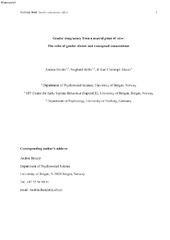| dc.contributor.author | Bender, Andrea | |
| dc.contributor.author | Beller, Sieghard | |
| dc.contributor.author | Klauer, Karl Christoph | |
| dc.date.accessioned | 2019-04-05T11:34:46Z | |
| dc.date.available | 2019-04-05T11:34:46Z | |
| dc.date.issued | 2018 | |
| dc.Published | Bender A, Beller S, Klauer KC. Gender congruency from a neutral point of view: The roles of gender classes and conceptual connotations. Journal of Experimental Psychology. Learning, Memory and Cognition. 2018;44(10):1580-1608 | eng |
| dc.identifier.issn | 0278-7393 | |
| dc.identifier.issn | 1939-1285 | |
| dc.identifier.uri | https://hdl.handle.net/1956/19294 | |
| dc.description.abstract | The question of whether language affects thought is long-standing, with grammatical gender being one of the most contended instances. Empirical evidence focuses on the gender congruency effect, according to which referents of masculine nouns are conceptualized more strongly as male and those of feminine nouns more strongly as female. While some recent studies suggest that this effect is driven by conceptual connotations rather than grammatical properties, research remains theoretically inconclusive because of the confounding of grammatical gender and conceptual connotations in gendered (masculine or feminine) nouns. Taking advantage of the fact that German also includes a neuter gender, the current study attempted to disentangle the relative contributions of grammatical properties and connotations to the emergence of the gender congruency effect. In three pairs of experiments, neuter and gendered nouns were compared in an Extrinsic Affective Simon Task based on gender associations, controlled for a possible role of gender-indicating articles. A congruency effect emerged equally strongly for neuter and gendered nouns, but disappeared when including connotations as covariate, thereby effectively excluding grammatical gender as the (only) driving force for this effect. Based on a critical discussion of these findings, we propose a possible mechanism for the emergence of the effect that also has the potential to accommodate conflicting patterns of findings from previous research. | en_US |
| dc.language.iso | eng | eng |
| dc.publisher | American Psychological Association | eng |
| dc.subject | cognition | eng |
| dc.subject | language | eng |
| dc.subject | grammatical gender | eng |
| dc.subject | Extrinsic Affective Simon Task (EAST) | eng |
| dc.subject | linguistic relativity | eng |
| dc.title | Gender congruency from a neutral point of view: The roles of gender classes and conceptual connotations | eng |
| dc.type | Peer reviewed | |
| dc.type | Journal article | |
| dc.date.updated | 2018-12-17T15:43:29Z | |
| dc.description.version | acceptedVersion | |
| dc.rights.holder | Copyright 2018 American Psychological Association | eng |
| dc.identifier.doi | https://doi.org/10.1037/xlm0000534 | |
| dc.identifier.cristin | 1639372 | |
| dc.source.journal | Journal of Experimental Psychology. Learning, Memory and Cognition | |
| dc.relation.project | Norges forskningsråd: 262618 | |
